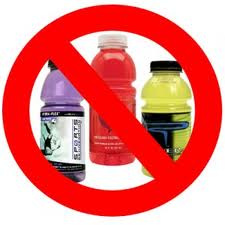
The sports drink's website also says that it is a special blend of sodium, potassium and chloride that replenishes minerals lost through sweat, along with electrolytes to help regulate a number of bodily functions. But what they don't disclose is the other ingredients that are arguably not healthy for any of at all! These ingredients include: high-fructose corn syrup (listed #2 after water), sucrose syrup (another sugar solution) and yellow 5 (an artificial food coloring.
What's Wrong with These Ingredients?
After all the media adds showing well known athletes drinking these sports drinks it's hard to not think that they are a healthy way to hydrate after a sorts game or workout. But the truth is, guzzling most sports drinks is like downing a few cans of soda. This is because high fructose corn syrup (HFCS) is a sweetener that may actually be worse for you than sugar. In fact, many experts suggest that HFCS, particularly those in sweetened drinks, are at least partly responsible for the obesity epidemic in America.
When glucose (a form of sugar) is consumed, various reactions occur in your body allowing the sugar to be used as energy, as well as the increased production of leptin, a hormone that helps control appetite and fat storage. Ghrelin, a stomach hormone, is reduced, which is though to help hunger go away.
When fructose is consumed, however, it "appears to behave more like fat with respect to the hormones involved in body weight regulation," explains Peter Havel, associate professor of nutrition at the University of California. He explains that fructose doesn't actually stimulate insulin secretion, the increase of leptin production or the reduction of ghrelin. This suggests that consuming a lot of fructose, like consuming too much fat, could contribute to weight gain.
Furthermore, most sports drinks contain various forms of added sugars. This may be good for a quick boost of energy for the short-term, but this is inevitably followed by a major energy crash.
The ingredient, Yellow 5, is what gives sports drinks their characteristic bright yellow glow and is also often even hidden in the other colored drinks. This ingredient has been found to cause allergic reactions, primarily in people who are sensitive to aspirin.
Research has also shown that sports drinks can also erode tooth enamel, even more than carbonated cola products due to the concentrated sugars. This is especially true if you sip them for long periods of time.
How Do Sports Drinks Effect Your Workouts?
If you're running a marathon or engagin in some other type of extremely intense exercise for a long period of time, the extra calories, sugar and electrolytes may be justifiable. But for the average gym-goer or child in sports after school, water is a much better choice to rehydrate your body.
A typical 20-ounce sports drink contains about 10 teaspoons of sugar and 130 calories, which is more calories than you might burn off during your workout. For the sports drinks I refered to above, the label lists 14g of sugar for one-quarter of the bottle. If you consume the whole bottle - as most people do after their workout - you're downing 56g of sugar! If you drink one sports drink per day for one year, this translates to a gain of 13 lbs!!!
Alissa's Suggestion
Stick to water for the best and most natural form of hydration. Drinking water is one of the best ways to quench your thirst before, during and after your workouts. Experts recommend drinking an additional 2-3 cups of water within two hours of finishing your workout. For more intense workouts, try about a 1/4 cup of 100% fruit juice mixed with water for a more natural and hydrating boost. You should then keep drinking water regularly throughout the day, as even when you don't feel thirsty it is still quite possible to be dehydrated.
Healthy wishes,
Alissa
(802) 999-5684

 RSS Feed
RSS Feed
